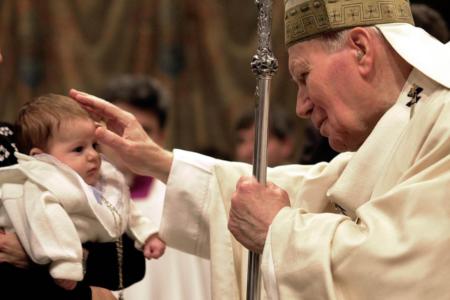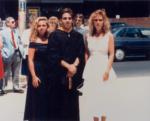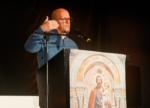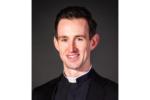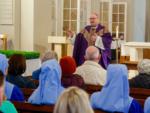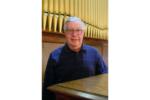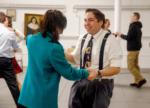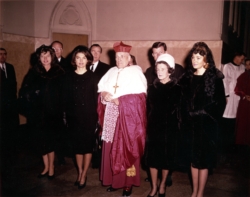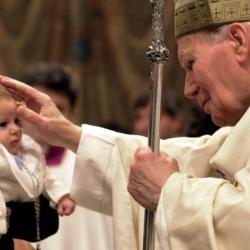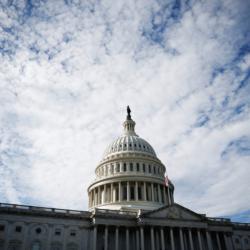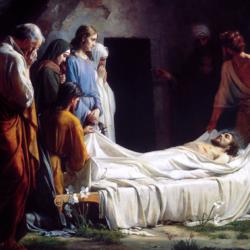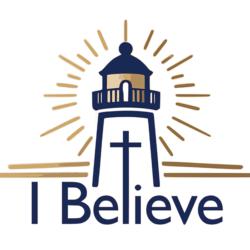Cardinal Cushing, BSO honored JFK with Mozart’s ‘Requiem’ 45 years ago
Even as the nation marks the inauguration of President Barack Obama, many still remember the time 45 years ago -- almost to the day -- when the people of Boston came together to bid farewell to another young and charismatic president, John F. Kennedy.
Mozart’s “Requiem Mass in D Minor” was celebrated at the Cathedral of the Holy Cross on Jan. 19, 1964, less than eight weeks after the tragedy in Dallas, by Cardinal Richard J. Cushing, performed by the Boston Symphony Orchestra under the baton of Erich Leinsdorf and broadcast on NBC radio and television.
It was the first time Mozart’s “Requiem” had been celebrated as a liturgy in the United States.
The invitations to the solemn pontifical requiem described the service as a civic and religious memorial, which brought together a unique confluence of the city’s religious, cultural and political leaders still roiling in the wake of President Kennedy’s assassination.
Francis X. Bellotti, who was the Commonwealth’s lieutenant governor when he attended the Mass, said the last time he saw the president alive, except for a brief photo opportunity in Washington, was when they sat together at an October 1963 fundraiser at the Commonwealth Amory.
There were 6,000 people at the fundraiser and Bellotti said as he sat with Kevin H. White, who was then the Secretary of the Commonwealth and later a four-term mayor of Boston, he saw Kennedy walk in from the other side of the hall.
Bellotti said that in his career he has had private moments with other American presidents and world leaders, but Kennedy was the only one who was truly different, a man who gave off incandescence. As the president made his way across the hall to the speaking platform where the two men were sitting, Bellotti, who was later the state’s attorney general, pointed to JFK and told White, “Now, there is a president!”
Bellotti said White told him, “He looks like the answer to every problem there ever was.”
One month later, Kennedy was dead.
Bishop Joseph T. McGuire, a bishop emeritus of Springfield, said he was a priest secretary to Cardinal Cushing working in the adjoining office to the archbishop at the chancery on Lake Street in Brighton Nov. 22 when the telephone rang.
“Are you watching TV?” asked Judge Francis X. Morrissey on the other end of the line, “The president has been shot.”
Cardinal Cushing was meeting with the commanding admiral of the First Naval District, which was headquartered in Boston, when his secretary walked in with the news, he said.
When he heard the news, Cardinal Cushing did not utter a word as he stood up and walked to his desk, Bishop McGuire said. The admiral stood up as well and left without a word. As the secretary left the office, the cardinal started working the phones.
In his office, Bishop McGuire turned on the television and saw that all the stations were covering the story; but all they could report was that the president had been shot, he said.
At Symphony Hall that day, which was the Friday after Thanksgiving, the Boston Symphony Orchestra was performing an afternoon concert. There is a recording of the conductor, Leinsdorf, announcing to the audience that the president had been shot. The audience erupted into gasps, but the performance continued.
Retired BSO cellist Luis Leguia said following the intermission, when the musicians returned to their seats, the program’s sheet music had been replaced with Beethoven’s funeral march from “Eroica” on each of their music stands. “That is when we knew the president was dead.”
It was after the president’s funeral, which Cardinal Cushing celebrated in Washington’s St. Matthew’s Cathedral, that the BSO’s chairman, Henry B. Cabot, approached the archbishop about the possibility of presenting a civic and religious memorial for the president in Boston.
Leinsdorf was involved in every detail of the musical program and it was his decision to perform the requiem by Mozart, said Maestro Joseph Silverstein, the symphony’s concertmaster at the requiem. He is now teaching at Philadelphia’s Curtis School of Music.
Other Masses or pieces, such as the Bach Passions, either involved many more soloists or were much too long, he said.
“Leinsdorf decided that it was the most appropriate under the circumstances. He was being realistic about the fact that it had to be performed compactly in the confines of the cathedral.”
Leinsdorf invited Sara Mae Endich, soprano; Eunice Alberts, contralto; Nicholas DiVirgillio, tenor and Mac Morgon, baritone to solo at the service. The 180-voice choir accompanying the BSO was divided evenly among the New England Conservatory, the combined Harvard Glee Club-Radcliff Choral Society and the Chorus pro Musica.
The choir from St. John’s Seminary, under the direction of Msgr. Russell H. Davis, sang responses and other parts of the liturgy.
Silversteinn said, “It was the first time I had ever heard or performed the ‘Requiem’ as an actual liturgy,” he said.
“We had performed it many times, but in the conventional performance we played it straight through. This time, we paused for the spoken parts of the Mass, which we were not used to but I rather liked it.”
At 9:30 a.m., 30 minutes before the Mass began, Cardinal Cushing met Jacqueline Kennedy at the rear of the cathedral and escorted her to the front pew. Most of the 1,800 congregants were already seated, as were the 180 singers from three choirs and the members of the Boston Symphony Orchestra, who sat on a raised platform on the Gospel, or left, side of the altar.
Sitting with the president’s mother, Rose Kennedy, in the front right-hand pew was her son, Sen. Edward. M. Kennedy, D, Mass., and his then-wife Joan Bennett Kennedy, who were already seated when the cardinal escorted the president’s widow down the aisle to join them.
Bennett Kennedy said at the time, that Jackie was still living in Washington and still grieving heavily for her husband. “She mourned for a very long time and Cardinal Cushing was very helpful to her.”
“I don’t remember it as a sad occasion. I remember it being rather joyful because of all the people who came because they loved Jack and they wanted to be a part of the Mass,” she said.
A classically trained pianist, she said, “The music was wonderful and beautiful. Mozart’s ‘Requiem’ is not a depressing work, it is graceful and powerful.”
At 10 a.m. the opening procession started down the aisle. The metropolitan cross was carried by the president’s cousin, Father John F. Fitzgerald, then stationed at Norfolk’s St. Jude Church.
The cardinal then celebrated the liturgy at the high altar, facing east with his back to the congregation, as Mass was offered at the time.
After the Mass, Cardinal Cushing offered a eulogy for the president in which he expressed the conviction that Kennedy was living in the mansions of the kingdom of heaven.
“Today, in the unforgettable music of Mozart, we have again in our hearts the stirring voice of our once-youthful leader; in the artistic expression of Mozart we caught the unmistakable accent of John F. Kennedy,” he said.
The former first lady was sturdy throughout the ceremony, but when the cardinal raised the body and then the blood of Christ, she lowered her face into her hands.
Facing the president’s widow after his eulogy, the cardinal said, “This day has a special meaning for all of us by the presence of our late, beloved president’s wife, valiant Jacqueline, who has taken herself from her sorrow for a few hours to pray to God with us in sacrifice and in song.”
The cardinal also saluted the late president’s mother Rose F. Kennedy as a resolute symbol of maternal strength and absolute confidence in God.
After his remarks, the cardinal walked from the altar and after he spoke privately with Jacqueline at her pew, he escorted her to the BSO platform where she thanked Leinsdorf and shook his hand. Later, Cardinal Cushing told reporters that the former first lady pronounced the service “magnificent.”
“John Kennedy belonged to Boston, not only by his father and grandfather on both sides, but because he was first elected from the Boston-Cambridge area before becoming president,” said Former State Attorney General Robert H. Quinn,
The events surrounding the president’s death and burial had occurred far away in Dallas and Washington, said Quinn, who was then the state representative from Dorchester’s Savin Hill neighborhood. “It was very significant for the people of Boston to be able to mourn for a Catholic president here in the archdiocese and in its cathedral.”
“We had to have something in Boston, because President Kennedy belonged to us. He was one of us,” said Gordon A. Martin Jr., then a civil rights attorney for the Justice Department in the South. “This was our opportunity to grieve.”
“But, the only reason we got in was because my wife Stephanie’s father was Paul Henry Lang, the music critic for the New York Herald Tribune,” the retired Massachusetts trial judge said.
It speaks to the importance of the Mass, that the Herald Tribune would send her father to Boston for the event, his wife said. “He thought it was great, but later he told me that after listening to the recording the performance was not as great as he remembered it. That tells me that even he was swept up in the emotion of the event.”
In his liner notes to the RCA Victor recording of the Mass, Father Daniel J. Honan wrote that Kennedy and Mozart were linked by more than their common humanity and common faith. Both men had left unfinished business when their time came. “Each died unwillingly in his youth. One cut down by an inexorable disease; the other by a pitiless bullet.”
The BSO actually performed the requiem as completed by one of his students, Franz Xaver Sussmayer, said Harvard’s Prof. Robert D. Levin, who composed the most accepted completion of the work.
“I remember very vividly the performance,” the professor said. “I watched it from my parent’s house in Rosedale, Queens with them. We watched in rapt attention, quite overwhelmed by the solemnity and the power of the moment.”
The performance was remarkable because it had both musical and religious significance, he said.
Levin said he was raised in a secular Jewish culture, but as he grew older the Christian liturgy took on a greater importance for him. “You cannot compose a piece of music about the crucifixion or a piece about the resurrection as a kind of skeptical outsider.”
This goes for Mozart and for himself, he said. “You can never divorce the music from its meaning and music of faith is above all a summons to faith.”
The Pilot’s music critic at the time, Joseph McLellen, wrote of the requiem: “One thing we have learned from President Kennedy’s death and all that followed it: the uses of ritual. There was a grief that transcended personal expression, a depth of feeling that words could not convey and tears could not assuage.”
